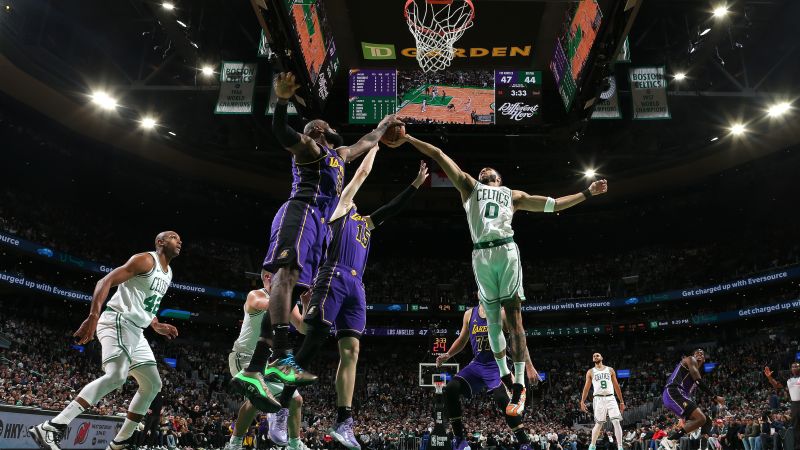The basketball landscape recently witnessed a monumental shift with the Los Angeles Lakers reaching a staggering franchise valuation of $10 billion. This record eclipses the previous high set just three months earlier by the Boston Celtics at $6 billion, illustrating the escalating financial stakes involved in professional sports. Despite the Lakers boasting a lesser number of championships compared to their archrival Celtics, their expansion in market value signifies not just team prestige, but also a changing tide in sports business economics.
Yet, this lofty valuation may soon be challenged. Reports suggest that the New York Giants of the NFL are preparing to sell a 10% ownership stake in the team. This transaction could potentially elevate the Giants’ total value beyond the current $10 billion threshold, as indicated by Marc Ganis, a veteran sports consultant from Chicago. Such developments highlight a broader pattern wherein the value of sports franchises is on a steep upward trajectory, primarily fueled by increased demand and a fixed supply of teams.
Victor Matheson, a sports economics expert at the College of the Holy Cross, emphasizes the dramatic appreciation of team values over the years. In his extensive research on sports transactions, he remarked that not once has he seen a team sell for less than what it was purchased for. A prime example is the Milwaukee Bucks, which sold a 10% stake for $4 billion in 2024, showcasing a remarkable appreciation from its initial purchase price a decade prior of $550 million. The valuation of the Lakers, hence, is a signal that even if it stands for a while, a future resounding price in the industry seems inevitable.
For fans, the reality of these soaring valuations is multifaceted. While many cheer for an owner who invests money to build a competitive roster, the correlation between wealth and success is not always straightforward. In fact, the relationship between a team’s financial prowess and its competitive performance often contradicts public sentiment. Fans typically prefer winning teams over deep-pocketed owners, emphasizing a desire for competitive success above all else.
Sports franchises view themselves as luxury assets or jewelry, representing a fixed supply akin to high-end real estate. According to Sal Galatioto, a premier sports investment banker, the economic principle of limited supply coupled with increasing demand results in skyrocketing prices. The media’s appetite for live sports content remains crucial too; with traditional advertising channels struggling after the rise of streaming services, live sports have emerged as gold mines for broadcasters.
The emergence of streaming platforms willing to invest in broadcasting rights has bolstered franchise valuations. Lori Bistis, a partner at PricewaterhouseCoopers, notes the growing significance of lucrative television deals in propelling franchise worth. Coupled with a deep understanding of fan demographics and spending behavior, the monetization of this data becomes essential for prospective buyers looking to maximize revenue streams.
The advent of legalized sports gambling post-2018 has further heightened interest and engagement surrounding sports franchises. With newfound revenue avenues, investors are eager to acquire stakes in teams, propelling valuations even higher. The allure of owning a piece of a beloved franchise infuses buyers with a sense of pride and status, distinguishing it from other conventional asset classes.
Billionaire Mark Walter initially bought a minority stake in the Lakers, and with his recent acquisition of the controlling interest, he has validated this model of investment. As CEO of Guggenheim Partners, Walter emphasizes the merits of investing in teams while also managing significant assets in organizations like the Los Angeles Dodgers, which themselves have invested heavily in their roster.
Despite substantial investments, history reveals that making waves in the competitive landscape isn’t solely about financial resources. The discrepancy in the conventional wisdom, especially in Major League Baseball, underscores that often teams with the highest payrolls do not guarantee the chance of winning a championship. Only two teams with the highest expenditure made it to win the coveted title in the last 15 years. This presents an interesting paradox for fans: the correlation between expenditure and success can be tenuous at best.
The dynamic of ownership and expenditures becomes increasingly critical, especially in leagues with salary caps, such as the NFL and NHL, where financial might plays a less influential role than strategic management and clever decision-making. Despite this, fan frustration often rises when ownership does not demonstrate a willingness to invest significantly in players.
In conclusion, the growing financial landscape of sports franchises signals a trajectory of increasing valuations, driven by factors such as owner profiles, advertising trends, and consumer behavior patterns. However, the juxtaposition between wealth and team success persists as a point of contention among fans, illustrating the complex nature of sports economics, equity stakes, and competitive performance.



